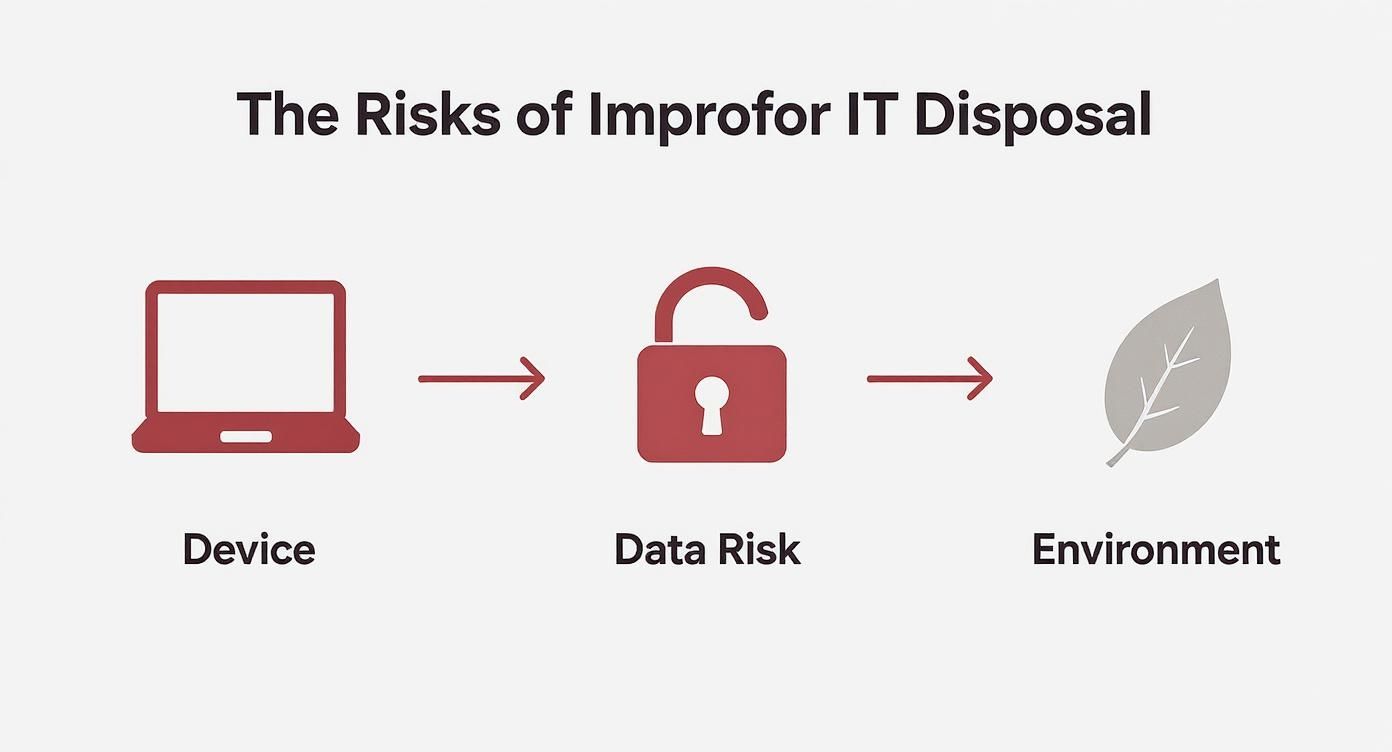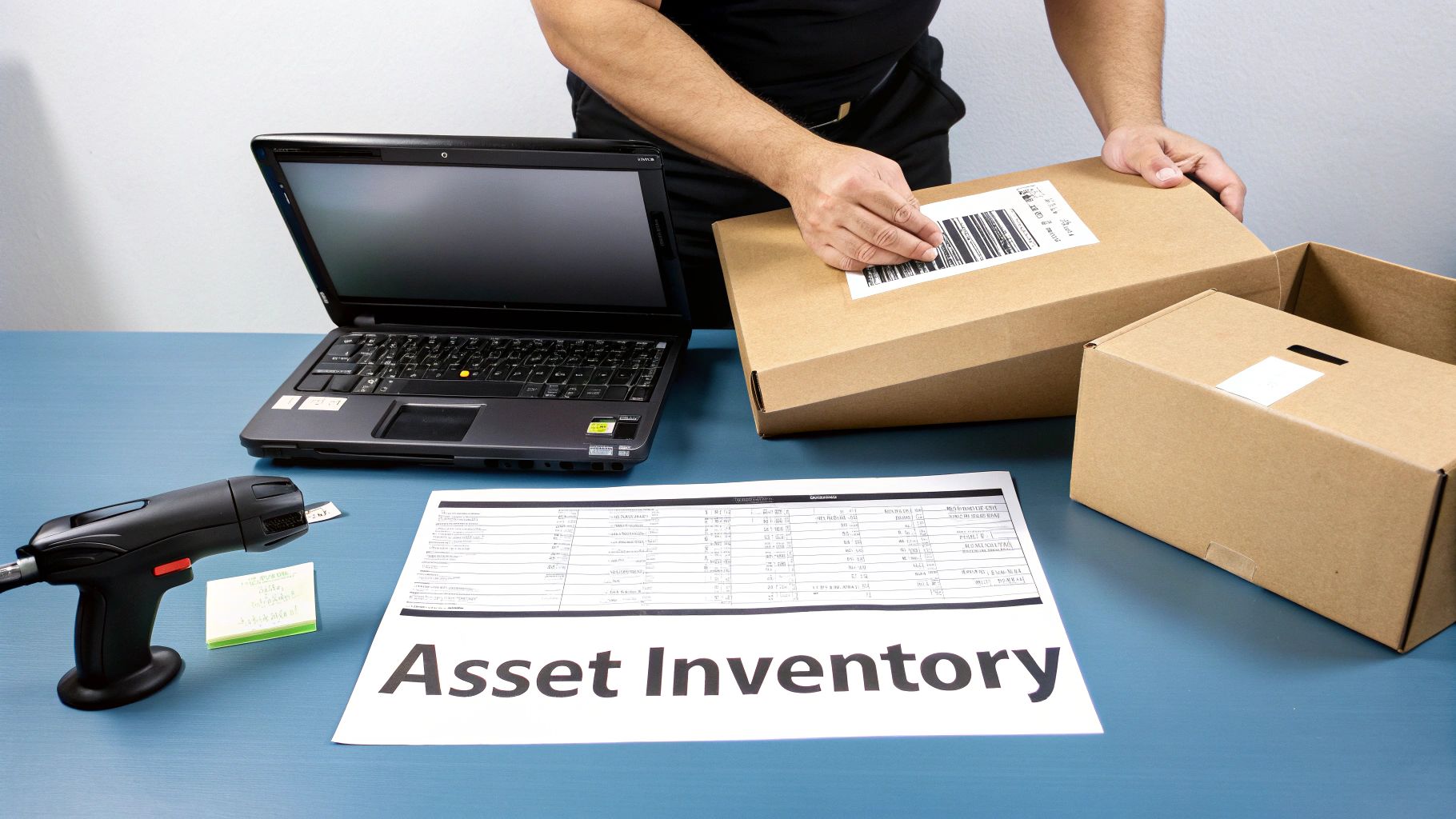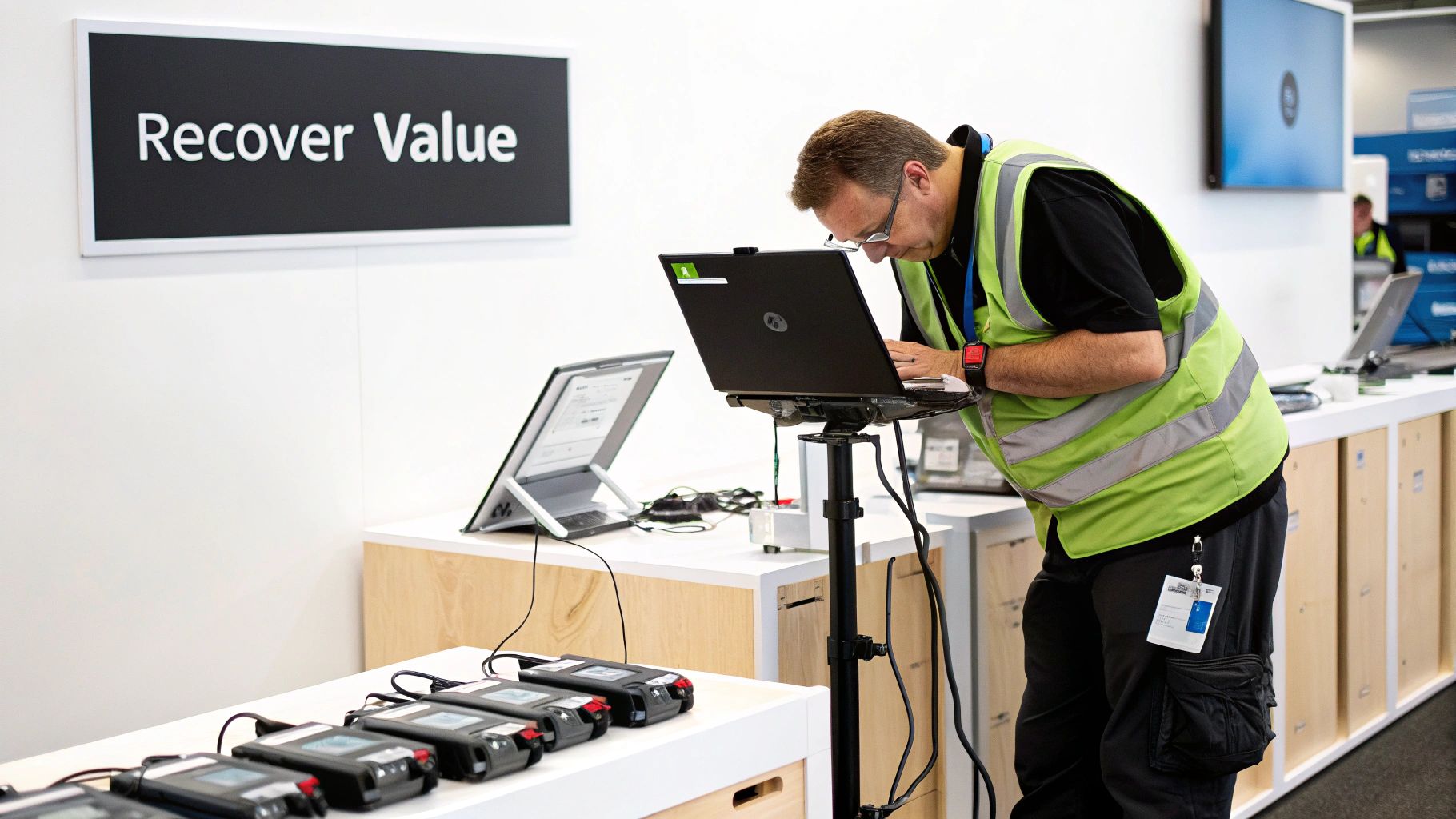Searching for "IT equipment recycling near me" isn't just about clearing out a storage closet. It's a major business decision, and getting it wrong can have some serious consequences. How you handle that old hardware is a direct reflection on your company's commitment to data security, environmental laws, and overall corporate responsibility.
Why You Can't Afford to Get IT Equipment Recycling Wrong
Every time your business retires a server, laptop, or phone, you're at a crossroads. Does that old device end up in a landfill, becoming a ticking time bomb of liability? Or does it go through a secure, responsible process that protects your company, your customers, and the environment?
That choice is the very foundation of a smart IT asset disposition (ITAD) strategy.
The Hidden Dangers in Your Old Hardware
That pile of obsolete electronics tucked away in a back room might seem harmless, but it's loaded with risk. Every single device, from an ancient desktop PC to a decommissioned data center server, is packed with materials and data that need professional handling.
- Data Security Nightmares: A single hard drive that isn't professionally wiped or physically destroyed can expose a treasure trove of confidential company data, client lists, and financial records. The fallout from a data breach—both in fines and lost reputation—can be devastating.
- Environmental Headaches: Your electronics are full of nasty stuff like lead, mercury, and cadmium. If they're just dumped, these toxins can seep into the local soil and water, creating a real hazard for the community.
- Costly Compliance Lapses: Strict regulations like HIPAA and GDPR have a lot to say about data privacy. Tossing e-waste in the dumpster can land you in hot water with regulators, leading to hefty fines and legal battles you don't want.
Let's be clear: hiring a certified recycler isn't just about "being green." It's a core part of your company's risk management. It's how you guarantee your data is gone for good and you're meeting your legal duties.
The E-Waste Mountain Keeps Growing
The sheer scale of this problem is hard to wrap your head around. Globally, we're on track to generate over 65 million metric tonnes of e-waste in 2025. What’s worse? Only about 20% of it actually gets recycled properly.
This isn't just a statistic; it's a wake-up call. Taking your IT recycling seriously is often the first step in developing broader sustainability initiatives. When you find the right local partner, you turn a simple disposal task into a strategic move that helps your bottom line and your community.
How to Vet and Choose a Reputable E-Waste Recycler
Finding a trustworthy partner for "it equipment recycling near me" goes far beyond a quick online search. There’s a massive difference between a certified IT Asset Disposition (ITAD) professional and a simple scrap hauler—a difference that directly impacts your data security, legal compliance, and environmental footprint.
Making the right choice means you have to look for specific credentials and ask the right questions. Without them, you have no real guarantee where your equipment—and more importantly, your sensitive data—will end up.
Look for Key Industry Certifications
Your first and most critical step is to check for industry-standard certifications. These aren't just fancy badges on a website; they are your absolute assurance that a vendor follows strict, audited standards for environmental safety, worker protection, and data privacy.
When you're vetting a potential recycler, put anyone holding an R2 (Responsible Recycling) or e-Stewards certification at the top of your list. These are the two leading global standards, and they provide a solid framework for handling electronics the right way.
- R2 (Responsible Recycling) This certification looks at the entire lifecycle of the equipment, from the moment it leaves your hands to its final disposition, making sure worker safety and environmental protection are prioritized.
- e-Stewards Known for being incredibly strict, this standard includes an absolute ban on exporting hazardous e-waste to developing countries, which is a common (and dangerous) practice for uncertified operators.
For any business handling sensitive information, choosing a certified partner is non-negotiable. You can find out more about what sets the top electronic waste companies apart in our detailed guide.
Key Takeaway: Certifications like R2 and e-Stewards are not optional extras. They are the baseline for proving a recycler operates legally, ethically, and securely, transforming a potential liability into a managed asset.
This infographic hammers home the serious risks of cutting corners with IT disposal, from devastating data breaches to long-term environmental damage.

As you can see, every single device you discard presents a dual threat if it isn't handled by a true professional.
To make this easier, here's a quick breakdown of what these certifications mean for you.
Key Certifications for IT Recyclers at a Glance
This table compares the top industry certifications to help you quickly identify qualified and responsible recycling partners.
| Certification | What It Guarantees | Why It Matters For You |
|---|---|---|
| R2v3 (Responsible Recycling) | Adherence to a comprehensive standard covering environmental, health, and safety practices. Tracks materials downstream. | Ensures your equipment is handled safely and legally, minimizing your liability and protecting your brand's reputation. |
| e-Stewards | The highest standard, with a strict ban on exporting hazardous waste and using prison labor. Includes rigorous data security protocols. | Provides the ultimate peace of mind that your e-waste won't cause environmental harm overseas and that your data is secure. |
| NAID AAA | Focuses exclusively on secure data destruction, with unannounced audits to verify compliance. | The gold standard for data security. If you handle highly sensitive information (medical, financial), this is a must-have. |
Ultimately, a recycler with these credentials has already proven they take their responsibilities—and your risks—seriously.
Scrutinize Their Data Destruction Methods
Once you've confirmed they have the right certifications, your next move is to drill down on their data destruction process. Any reputable recycler will offer several secure methods and, crucially, provide the paperwork to prove the job was done right.
Don't be shy—ask potential vendors to detail their process for different types of media, from hard drives to solid-state drives.
Their services should always include options like:
- Data Wiping: Using professional software to overwrite data according to standards like the Department of Defense (DoD 5220.22-M) or NIST 800-88.
- Degaussing: Hitting hard drives with a powerful magnetic field that completely destroys the magnetic alignment—and thus, the data.
- Physical Shredding: The most direct method. They'll grind hard drives, tapes, and other storage media into tiny, irrecoverable pieces.
This is critical: Always insist on receiving a Certificate of Data Destruction for your records. This document is your legal proof that your data was permanently and securely destroyed, which is essential for audit trails and staying compliant with regulations like HIPAA or GDPR.
The Real Risks of Improper Equipment Disposal
Choosing the wrong vendor—or worse, just trying to make old equipment disappear—opens your business up to some serious consequences. Searching for "IT equipment recycling near me" is about way more than convenience; it's a critical risk management task. Cutting corners here can lead to a world of financial, legal, and reputational pain.
Every single device you get rid of is a potential landmine.
Picture this: a stack of old company laptops gets handed over to some uncertified hauler who offered the lowest price. One of those laptops holds years of sensitive client data on its hard drive. If that drive isn't professionally destroyed, it could easily end up for sale online or in the hands of a data thief, triggering a massive data breach that completely shatters customer trust and brings regulators knocking at your door.
The High Cost of a Single Mistake
This isn't just some theoretical scare tactic. A single improperly discarded hard drive can become an absolute nightmare. The financial fallout goes way beyond any initial fines. You're looking at legal fees, the cost of customer notifications, paying for credit monitoring services for every affected person, and the long-term, hard-to-measure damage to your brand.
And that's just the data side of it. Your old electronics are packed with nasty materials like lead, mercury, and cadmium. When this stuff gets dumped in a landfill, those toxins leach into the soil and can contaminate local groundwater. This is a direct threat to the ecosystem and the health of the community you operate in. To really grasp the scale of the problem, you can explore the full environmental impact of electronic waste and see why responsible disposal is so vital.
Choosing a certified recycler is your front-line defense. It's the only way to ensure toxic materials are handled safely and that your sensitive data is verifiably destroyed, protecting you from liability on all fronts.
Navigating the Legal Minefield
Then there's the web of regulations you have to deal with. Laws like the Health Insurance Portability and Accountability Act (HIPAA) for healthcare data and the General Data Protection Regulation (GDPR) for personal data have incredibly strict rules about protecting information, even after a device is retired.
Failing to comply isn't a slap on the wrist. Violations can lead to penalties stretching into the millions of dollars. A certified ITAD partner provides the one thing you absolutely need: a documented, auditable process that proves you met your legal obligations. That documentation, especially a Certificate of Destruction, is your golden ticket—the proof that you acted responsibly and took every necessary step to protect confidential data.
Preparing Your Equipment for Secure Recycling
Before your recycling partner even shows up, a little prep work on your end can make the entire process smoother, safer, and more buttoned-up. Think of it as the final checkpoint before your old tech starts its next chapter. Getting this right protects your data and gives you a clear chain of custody for every single asset walking out the door.
First things first, you need a detailed asset inventory. I'm not talking about a rough headcount. This means getting down to the nitty-gritty: document serial numbers, asset tags, and the specific type of device for everything on its way out. This list is your definitive record—your proof of exactly what was handed over.

This inventory is especially critical for all the smaller stuff. It's easy to track big servers, but what about phones and laptops? According to global e-waste trends from The Roundup, a shocking 22% of small IT equipment gets properly recycled. A thorough list ensures these data-heavy devices don't just disappear.
In-House Data Security Preliminaries
Your certified recycler will handle the final, heavy-duty data destruction, but taking a few initial steps in-house adds a valuable layer of protection. It's a smart way to show due diligence on your part.
Here's what you can do before the truck arrives:
- Log Out of Everything: Make sure every device is disconnected from company networks, cloud services, and any individual user accounts.
- Run Factory Resets: For mobile devices and certain laptops, a factory reset is a good first pass at wiping user data.
- Pull the Drives: If your company policy allows it and you've got the tech staff, physically removing hard drives or SSDs is a fantastic security measure. These can then be set aside for separate, secure destruction.
If you want to get deeper into the weeds on this, our guide on how to wipe a computer before recycling has you covered.
Pro Tip: Slap a label on any machine that's had its hard drive removed. It's a simple step, but it helps the recycling team work faster and more accurately, making sure nothing gets missed.
Lastly, try to organize and pack the equipment logically. Grouping similar items—laptops with laptops, monitors with monitors—makes the pickup go much quicker and helps your recycling partner get started without any delays.
Unlocking Value from Your Retired IT Assets
Tossing out old IT gear isn’t just about destruction anymore. Believe it or not, many of those retired devices still have plenty of life left in them—either financial or social value—and a smart strategy helps you cash in. This is where IT Asset Disposition (ITAD) comes into the picture, moving way beyond basic recycling to maximize what you get back.
A good ITAD partner doesn't just see a pile of junk. They see potential. Instead of shredding everything in sight, they’ll evaluate your equipment for any resale value. Newer, functional assets—think laptops, servers, or networking gear—can often be refurbished and sold on the secondary market. This process can actually generate revenue, turning what you thought was a disposal cost into a check coming back to your business.

This approach is a game-changer, especially for companies retiring large fleets of recent-model devices. For those bigger, more complex projects, you really need to understand the full scope of handling assets securely. Our overview of professional data center decommissioning services is a great resource if you want to dive deeper into that process.
Giving Back Through Equipment Donation
Another fantastic option is donating your functional equipment. It’s a path that offers some pretty compelling perks:
- Community Goodwill: Nothing builds your local reputation like supporting schools or non-profits that are making a difference.
- Tax Deductions: Donations can often qualify for valuable tax benefits, giving you a direct financial incentive.
- Sustainability: Keeping your devices in circulation is a huge win for the circular economy and a tangible way to reduce e-waste.
A quick but critical note here: Before any device leaves your possession for donation, make absolutely sure your ITAD partner performs certified data wiping. This is non-negotiable. It protects your company’s sensitive information while letting your old hardware start a new, productive life somewhere else.
Got Questions About IT Recycling? We've Got Answers.
Even when you have a solid plan, a few practical questions always pop up when you start searching for "IT equipment recycling near me." It's completely normal. Let's walk through some of the most common ones we hear from businesses, so you can move forward with confidence.
How Much Is This Going to Cost?
This is usually the first question, and the honest answer is: it depends.
For just a couple of items, some recyclers might let you drop them off for free. Others might charge by weight or have special fees for tricky items like old, bulky CRT monitors.
But for businesses, the game changes. If you have newer, valuable assets, a full-service ITAD partner might handle the entire process at no charge. They might even pay you for the equipment if it has good resale value. The only way to know for sure is to get a detailed quote right from the start.
What Actually Happens to My Company's Data?
This is the big one, and it's where you absolutely cannot cut corners. When you hand over your devices, you're also handing over a massive responsibility.
A certified, professional recycler is bound by a strict, documented process. They're not just hitting "delete." They use industry-standard methods like multi-pass software wiping, powerful degaussing that scrambles magnetic fields, or physical shredding that turns hard drives into tiny fragments.
The most critical piece of this puzzle for your business is the documentation you get back. Understanding the value of a certificate of destruction is everything. This isn't just a receipt; it's your legally binding proof that every last byte of data was properly destroyed, shielding you from compliance headaches and future liability.
Don't Forget This: Never, ever partner with a recycler who can't provide a serialized Certificate of Data Destruction. It's your single most important piece of evidence that you did your due diligence.
Can I Use the Same Service for Business and Personal Stuff?
While many recyclers technically serve both individuals and companies, the needs are worlds apart. Business recycling is a whole different beast.
It requires asset tracking, detailed reporting for audits, and certified data destruction to meet compliance standards like HIPAA or SOX. For your personal electronics, local municipal e-waste events or even retail take-back programs are often great, convenient, and secure options.
Ready to handle your company's IT assets the right way? Montclair Crew Recycling offers secure, compliant, and responsible electronics recycling services for businesses across Metro Atlanta. We provide certified data destruction and a clear chain of custody to protect your organization. Get a fast and free quote for your IT equipment recycling today!
